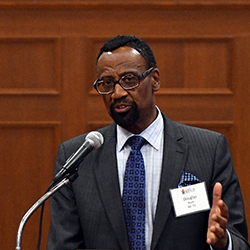On January 18 every year, we come together to remember the great man that was Dr. Martin Luther King Jr. He was a key figure in the fight for civil rights in the United States and across the world. His messages of peace and equality still ring in the hearts of many till this day and will continue for years to come. This year the Dalhousie Black Students’ Advising Center hosted an online panel event in honour of Martin Luther King Jr. Day, that brought together the Dalhousie and King’s community, “The Legacy of Martin Luther King Jr.: Resiliency at Difficult Times While Hoping for a Better Future.”
“‘Let us not seek to satisfy our thirst for freedom, by drinking from the cup of bitterness and hatred.’ Standing on the words of this great man, let’s not walk alone in our fight against every form of discrimination and bigotry. Let us join our hands, hearts and minds from every corner of the globe.”
Quoting Dr. King, these powerful words were from the kind heart of Oluronke Taiwo, of the Black Students’ Advising Centre. Taiwo kicked off this empowering night by introducing moderator Tiffany Gordon, a Ph.D. student at Dalhousie studying philosophy. Taiwo also had the honor of introducing the event’s entertainment, a performance by Emmanuel Solomon, a music student with a concentration in vocal works at Dalhousie’s Fountain School of Performing Arts. The four panelists speaking at the event were the Dalhousie Director of African Nova Scotian Community Engagement Jalana Lewis, social worker and sociologist Dr. Robert Wright, the Simon & Riva Spatz Visiting Chair in Jewish Studies at Dalhousie, Dr. Lissa Skitolsky, and lawyer and Chair of the King’s Board of Governors, Douglas G. Ruck, QC.

Douglas Ruck, QC, Chair of the King’s Board of Governors, spoke at the Black Students’ Advising Center’s online Martin Luther King Jr. Day panel.
Jalana Lewis graduated from Dalhousie Law School in 2013 and was valedictorian of her class. She was also a key researcher in the Lord Dalhousie panel, that dove deep into the historic connections between Dalhousie University, race and slavery. Lewis talked about how important resilience is during this challenging period. Especially during the current COVID-19 pandemic, and the ongoing Black Lives Matter (BLM) movement and its calls to defund the police. “As a member of the African Nova Scotian community, I don’t need to look far to find … powerful resilience,” Lewis said, adding that for her, resilience means helping people in her community who face different kinds of challenges, such as being given proper mental health services and access to proper education.
Dr. Robert Wright is a social worker and sociologist whose career of over 30 years has spanned the fields of education, child welfare, forensic mental health, trauma, sexual violence, and cultural competence. “Martin Luther King, although he was American of course, has been a hero and model for resilience and hope for the entirety of the African diaspora and people of African descent,” Dr. Wright said. Dr. Wright spoke on the need for resilience and how it creates hope, highlighting a quote by Theodore Parker that Dr. King incorporated into many of his speeches: “The arc of the moral universe is long, but it bends toward justice.” Dr. Wright ended his comments with the reassuring words that no matter the struggle we face, the universe will bend to justice in the end.
Douglas G. Ruck, QC, is the Chair of the Board of Governors at King’s. Ruck began by acknowledging how important the event is and how its topic affects everyone, pointing to the recent attack on the Capitol Building in Washington, D.C., as evidence of deep-rooted prejudice. “What happened on January 6th wasn’t a ‘wake up call.’ Rather it is something that has been on the horizon for a very long time…. We must now address it,” he said. Ruck pointed to the shock expressed about the fact that the angry mob called for the hanging of Mike Pence, then U.S. Vice-President, and said that the historic treatment of Black people has made them used to hearing calls for lynching—the difference here was that the person targeted was a white man.
Ruck also talked about growing up listening to Dr. King speak, and how he gave people in Canada hope; how he gave Black people in general hope. In spite of the constant struggle, violence, and discrimination, Doug Ruck saw hope in all of those struggles.
Dr. Lissa Skitolsky is currently serving as the 2020-2021 Simon & Riva Spatz Visiting Chair in Jewish Studies at Dalhousie. Dr. Skitolsky expressed appreciation for the opportunity to talk about the importance of hope in these trying times. “Hope is not opposed, but rather emerges from out of despair,” Dr. Skitolsky quoted from Dr. King. She went on to talk about how hope is not a force, but an expression of resolve and a response to atrocities that “provoke our moral horror.” Skitolsky stated that people who harbour ideologies of hate do not actually have any hope, as they do not believe in the possibility of spiritual renewal.
After each panelist spoke on the importance of Dr. King to them the floor was open for people to ask questions, which focused on racism and its effects, and how we can come together as a community to address these problems.
At the end of the day, the overall message of this event was to never give up hope. You must always be resilient in the face of adversity in order to create change in a world that is plagued with injustice.
Photo: Martin Luther King Jr. Memorial in Washington D.C., photo by Gage Skidmore

